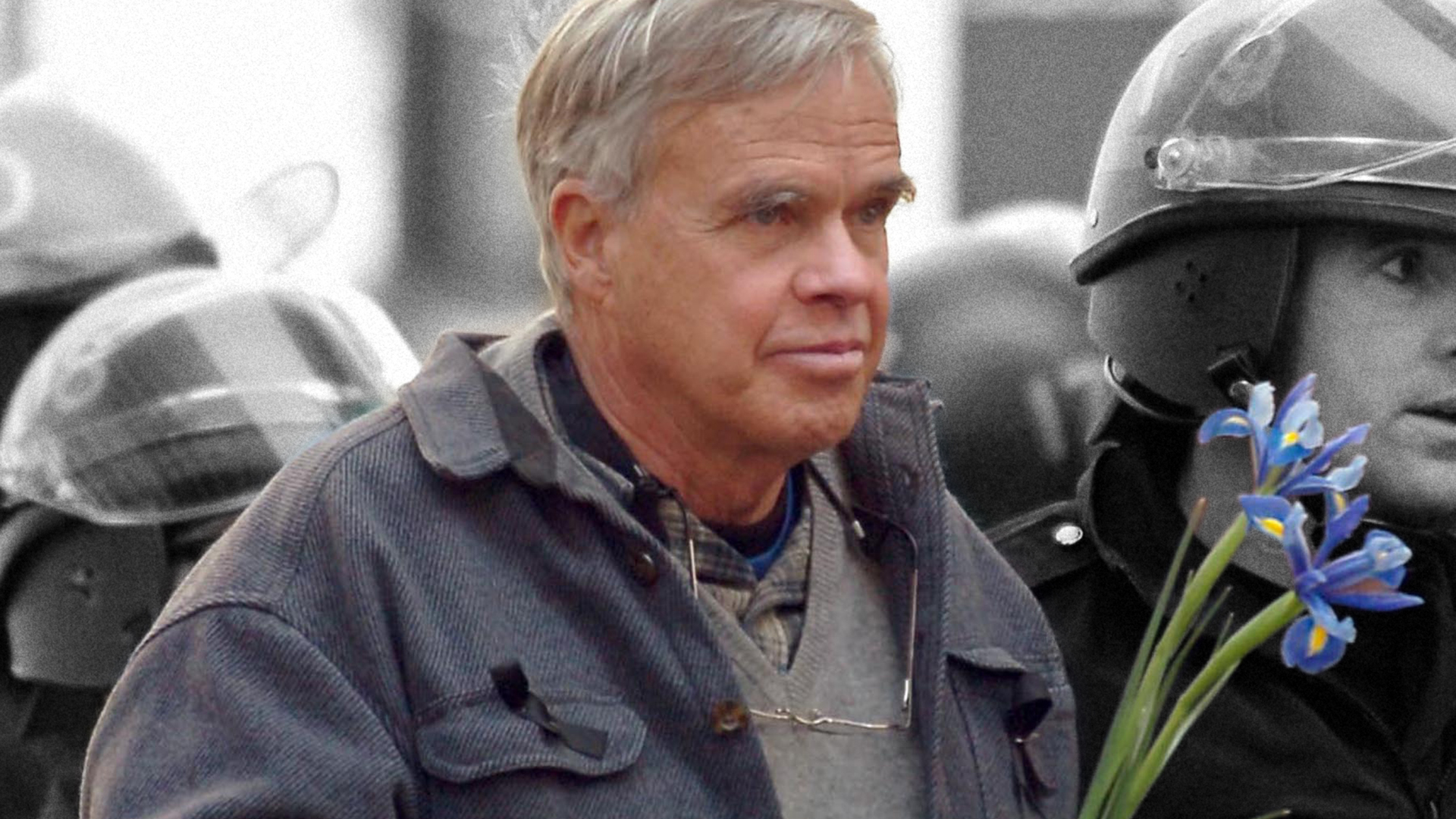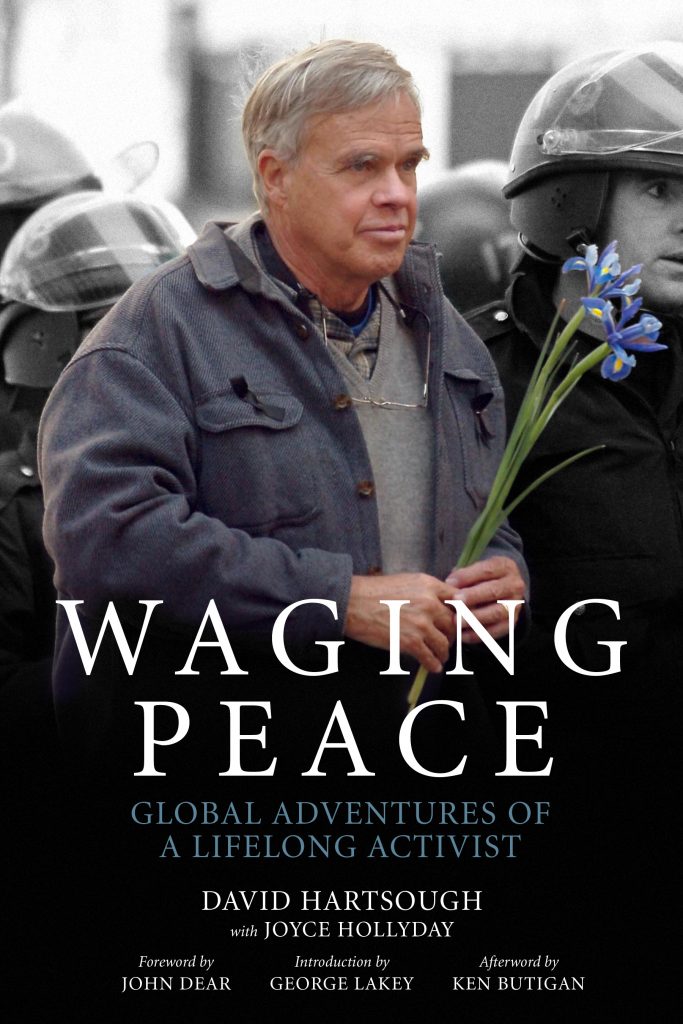By Patrick Jordan
Catholic Worker, NYC
March 2015
If Ammon Hennacy were around to update his 1970 posthumously published The One-Man Revolution in America,
he would likely add a chapter on David Hartsough (b. 1941). For nearly
sixty years, this Quaker-inspired activist has resisted war, racism, and
injustice at home and literally around the world. Hennacy’s book was a
veritable Profiles in Courage for America’s unsung peacemakers and radicals. In Waging Peace,
David Hartsough brings that tradition up-to-date by forty years, every
year of which includes his actions of protest and courage.
This
autobiographical record begins with David’s Ohio roots. His mother was a
first-grade teacher and an activist, his father was a Congergational
minister. At age seven, young Hartsough faced down a group of town
bullies who had bloodied him. Later, he sought out—and became friends
with—their jefe.
From there the story moves quickly to
Pennsylvania, where the teenage David organizes his first peace protest
(at a Nike missile site); then to Virginia, where the angered patron of a
segregated lunch counter David and others were attempting to integrate
threatens his life; and then on to the White House, Berlin, Red Square,
and even the Holy Land, all places where he demonstrates nonviolently
for reconciliation. The book concludes half a century later, with his
arrest outside a U.S. drone base.
I got to know David (a fitting
name for one taking on Goliaths), his wife Jan, and their two small
children in 1970 at Pendle Hill, the Quaker Study Center outside
Philadelphia. He had just completed an arduous, five-year stint as a
national organizer for the Friends Committee on National Legislation.
Little did I know, until reading Waging Peace, that in that
capacity he had organized many of the huge antiwar demonstrations
Catholic Workers and others had taken part in during the 1960s; or that
before that, his father had worked with Martin Luther King Jr.; that
Bayard Rustin had encouraged David to enroll at Howard University in
Washington, D.C., and that in 1960, with fellow student Stokely
Carmichael, he had led protests for integration in Virginia; or that as
part of a 1962 Quaker delegation, he had met with President John F.
Kennedy to call for a national policy of “waging peace”: the inspiration
for this book’s title.
David first came to the attention of J. Edgar Hoover and the FBI at age fifteen. In fact, Waging Peace
reads like a chronology lifted from his FBI file—a lifetime of
protests, arrests, and agency misperceptions concerning David’s actions
and motivations. It’s not hard to see why. There are his Quaker summer
work camp in Cuba (1959), only months after Castro overthrew the
U.S.-backed dictatorship of Batista; David’s experience in Communist
Yugoslavia the following summer (he would return again in 1997,
attempting to reconcile warring Serbs and Kosovars); his junior year in
Germany (1961), auditing classes at East Berlin’s Communist Humboldt
University; and summer forays for students he organized to Eastern Bloc
countries and the Soviet Union in 1961 and ’62. There, David was nearly
arrested in Red Square and threatened with twenty years in prison for
demonstrating against nuclear testing. Back in the U.S., he was arrested
outside the White House during a similar demonstration. In one
instance, he was released from jail in the nick of time to accept his
college diploma. Then came alternative service as a conscientious
objector, a master’s degree in international studies at Columbia, five
rewarding but hectic years in Washington, D.C., with Quaker lobbying
groups, and marriage and a family.
Here is where the story
gets particularly interesting and challenging for someone like me, close
to David’s age and with a similar family constellation. For during
David’s time at Pendle Hill, he and Jan decided to continue following a
path of protest and simple living that would allow them to take risks in
the service of peace and to resist paying the federal taxes that go for
military expenditures (over 50 percent of the annual discretionary
budget). A simple lifestyle, often shared with other like-minded
families in community, allowed the Hartsoughs to live below a taxable
income for many years. When they did exceed that minimum, they made it
difficult for the IRS to extract its blood money. The IRS threatened to
confiscate their home, but eventually settled for garnishing a savings
account. For over forty years, the Hartsoughs have been able to resist
paying war taxes outright; during the same period they have welcomed
countless guests, all the while remaining exemplars of sane and caring
resistance.
Ammon Hennacy would be particularly impressed with
the long, consistent list of David Hartsough’s protests, fasts, and
jailings. They include organizing several peace flotillas to block free
passage of munitions ships during the Viet Nam War; helping form the
Abalone Alliance (1977-84) to impede completion of the Diablo Canyon
nuclear power plant; protests and arrests at the Lawrence Livermore
National Laboratory (1981-83). These were followed by years of actions
against U.S. counterinsurgency policies in Central America, based on
David’s own fact-finding trips to the region. He personally accompanied
threatened villagers in Chiapas, Mexico, as well as Guatemala,
Nicaragua, and El Salvador. In 1987, he and others pledged to disrupt
weapons shipments to Central America from the Concord Naval Weapons
Station in California.
In one of those protests, his good friend
Brian Willson was run down and nearly killed by a munitions train. The
callousness of the event, and David’s assistance to Willson, then and
for many years after the train had severed Willson’s legs, make for
heart-pounding reading. “The war came home in a powerful way that day,”
David recounts. “What our government had long been willing to do to poor
people and people of color in other parts of the world, it was also
willing to do to peaceful protesters in the United States who tried to
impede the war effort.”
Here, as elsewhere, David reflects on
the necessary courage of those who would wage peace. The Concord protest
lasted 875 days. David was arrested repeatedly, but, he writes, “an
amazing, inspiring community grew up around the Concord tracks,” one
that included ex-CIA agents, many war veterans, and even his own aged
and infirm parents.
David later traveled to the Philippines, the
Soviet Union, Iran, and the former Yugoslavia; and served as executive
director of the activist group Peaceworkers. In 2001, he co-founded the
Nonviolent Peaceforce with Mel Duncan. Its aim is to send teams of
nonviolent “soldiers” into war-threatened areas to short-circuit
violence and offer peaceful models of resolution. David’s arrest in
Kosovo in 1997, under orders from Serbian leader Slobodan Milosevic, is
another heart-palpitating episode in this inspiring chronicle. For
David, nonviolent protest for change is never on the cheap. The
Nonviolent Peaceforce has now fielded support groups in over forty
countries, and has received growing recognition and support from the UN
and the European Union.
In his final chapters and appendices,
David provides further stories of successful nonviolent campaigns and
offers resources for those wishing to challenge the status quo. He finds
hope in living near his own grandchildren; contact with them, he
writes, “renews our commitment to helping build a world in which all
children can look forward to a future of peace and justice.”
If
anything might have further enriched this book, it would have been to
include more about the author’s own inner geography: the effect of the
storms he experienced on his inner thought and person. Further, the
macro geopolitical landscape alluded to here relies almost entirely on a
“Democracy Now” point of view. For many readers that will be a high
compliment, even an endorsement; for others, it will seem an unnecessary
but limiting liability. For those who don’t know David Hartsough in
person and have not experienced his hearty, self-deprecating laughter,
his purity of spirit, and his hospitality, that might diminish this
exemplary autobiography. That would be a loss for our times, so in need
of exemplars and “one-man revolutionaries.”
Waging Peace
is a book that challenges, inspires, and offers hope: all gifts that
will endure and even transcend the heroic witness of its remarkable
author.







